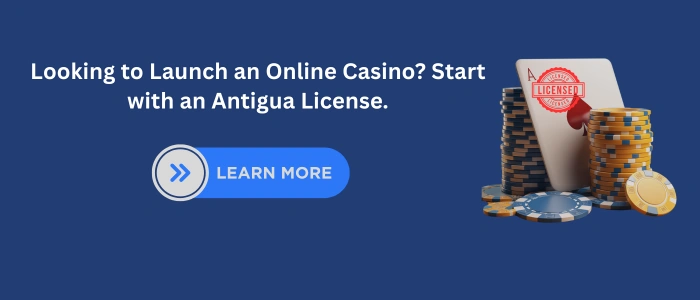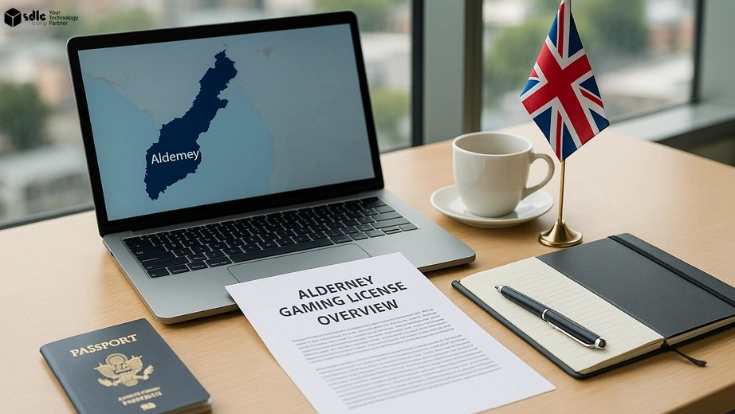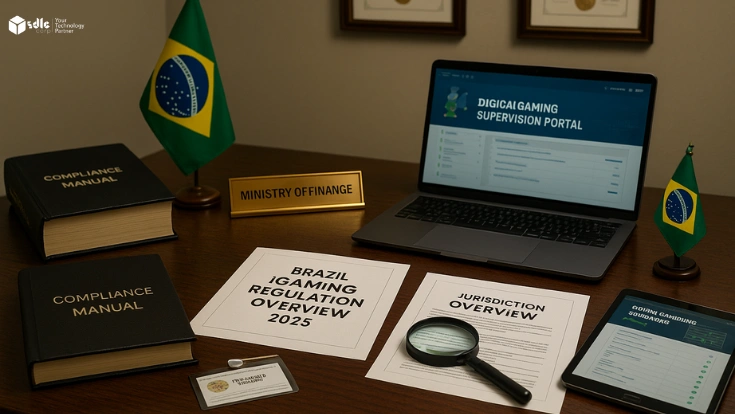Introduction
Antigua and Barbuda has emerged as a pioneering force in the global online gaming industry. Since the enactment of its gaming laws in the mid-1990s, this Caribbean nation has continued to refine and expand its regulatory framework to meet international standards. As one of the first jurisdictions in the world to legalize online gambling, the country is now a sought-after destination for operators seeking credibility and favorable terms in the iGaming space.
Whether you’re launching an online casino, sports betting site, or any other iGaming venture, understanding the Antigua and Barbuda gaming license requirements is essential. This blog walks you through the legislation, application procedures, licensing types, costs, compliance needs, and strategic advantages. Let’s explore the essentials.
Explore another Caribbean license option in our Kahnawake Gaming License blog.
A Snapshot of Antigua and Barbuda’s iGaming Legacy

Antigua and Barbuda gained international recognition when it legalized and regulated online gaming in 1994 under the Free Trade and Processing Zone Act. The country’s early entry established a structured environment for virtual gaming, long before most jurisdictions addressed the industry.
Oversight is managed by the Antigua Gaming Commission, under the Financial Services Regulatory Commission (FSRC). The commission ensures that licensed operators comply with comprehensive standards, including anti-money laundering measures, player protection, and responsible gambling.
For insights into another well-respected regulator, see our Alderney Gaming License guide.
Types of Gaming Licenses in Antigua and Barbuda

There are two primary licenses available under Antigua’s framework:
- Interactive Gaming License
This license covers traditional casino-style games such as slots, poker, roulette, and blackjack. Operators running virtual casinos must acquire this license. - Interactive Wagering License
This license is tailored for sports betting platforms and includes fixed-odds and live wagering on sporting events.
Understanding the difference between Interactive Gaming vs Interactive Wagering license Antigua is essential when selecting the right path for your business.
Compare license types and structures in our Curacao Gaming License overview
Antigua and Barbuda Gaming License Requirements

To obtain a license, applicants must undergo a detailed vetting process. The following are the key Antigua and Barbuda gaming license requirements:
- Detailed Business Plan: Including financial projections, operational model, and marketing strategy.
- Corporate Documentation: Certificate of incorporation, shareholder details, and beneficial ownership information.
- Due Diligence Checks: Background verification for all directors and significant shareholders.
- AML and KYC Policies: Must align with Antigua and Barbuda iGaming legislation AML KYC regulations.
- Technical Framework: Including server infrastructure, gaming software, RNG certifications, and cybersecurity protocols.
- Financial Viability: Proof of capital to operate sustainably.
Transparency and commitment to player safety are at the core of the licensing process.
Cost of Antigua and Barbuda iGaming License

Costs vary based on the size and complexity of operations, but here’s a general overview of the cost of Antigua and Barbuda iGaming license:
| Fee Type | Estimated Cost (USD) |
|---|---|
| Application Fee | $15,000 |
| Annual License Fee | $100,000 |
| Due Diligence (per person) | $5,000–$10,000 |
| Legal & Consulting Services | $20,000–$50,000 |
While these costs are premium, they reflect the jurisdiction’s strong reputation and investor-friendly environment.
Antigua Gaming Commission FSRC License Process

The Antigua Gaming Commission FSRC license process is thorough but streamlined. It includes the following stages:
- Initial Consultation: Applicants often consult local experts or attorneys for guidance.
- Document Preparation: Submission of all business, financial, and technical documentation.
- Background Checks: FSRC conducts due diligence on all key personnel.
- Interviews: The Commission may schedule interviews to assess the applicant’s business model.
- Technical Audits: Infrastructure and gaming software undergo compliance testing.
- Approval and Issuance: Once all requirements are satisfied, the license is granted.
The process usually takes between 8 and 12 weeks.
Need help with application steps? Don’t miss our How to Apply for a Gambling License guide.
Regulatory Compliance: AML, KYC, and Fair Gaming
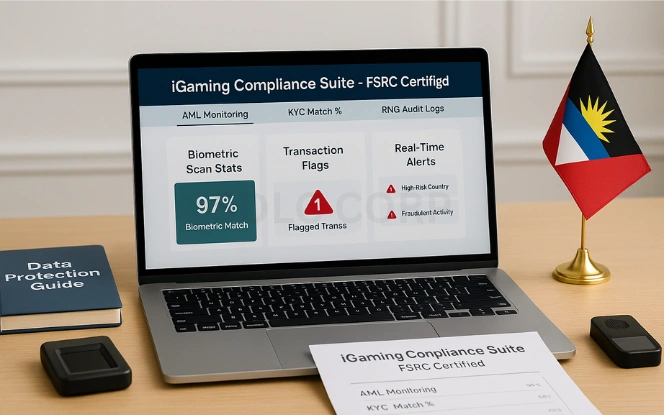
Antigua and Barbuda’s regulatory environment is closely aligned with global standards. Its focus on Antigua and Barbuda iGaming legislation AML KYC requirements ensures legal and ethical business conduct:
- KYC Protocols: Require proper identity verification before account access.
- AML Procedures: Operators must detect and report suspicious financial activity.
- Data Security: Retention of transactional and user data for at least five years.
- Fair Gaming: All gaming software must be certified for fairness and randomness.
These policies build trust with players and help protect the integrity of the market.
Want to understand global KYC trends? Read our Compliance in iGaming blog.
Advantages of Antigua and Barbuda Online Gambling License
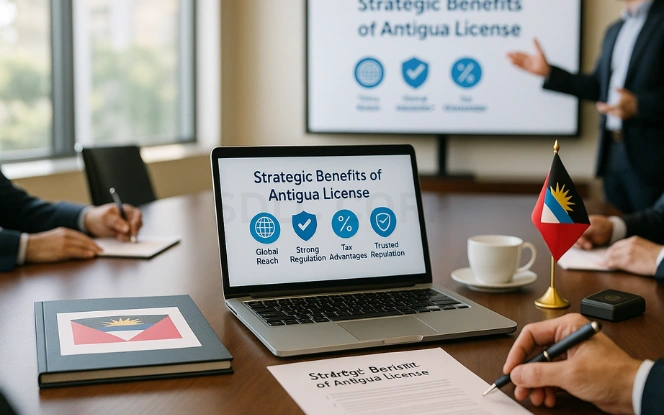
The advantages of Antigua and Barbuda online gambling license extend beyond regulatory credibility:
1. International Recognition
A license from Antigua carries long-standing prestige due to its early adoption and consistent regulatory oversight.
2. Tax Benefits
Licensed operators are exempt from income taxes on revenues generated from offshore players.
3. Full Foreign Ownership
The jurisdiction allows 100% foreign ownership, making it appealing to international startups.
4. Quick Processing
Compared to other markets, the approval timeline is relatively short.
5. Strong Regulatory Oversight
Despite its offshore classification, Antigua maintains a robust compliance framework.
6. Competitive Environment
The territory provides a balanced ecosystem for startups and established operators alike.
Explore more benefits in our feature on the How to Get a Panama Gambling License?
Comparing Antigua with Other Gaming Jurisdictions
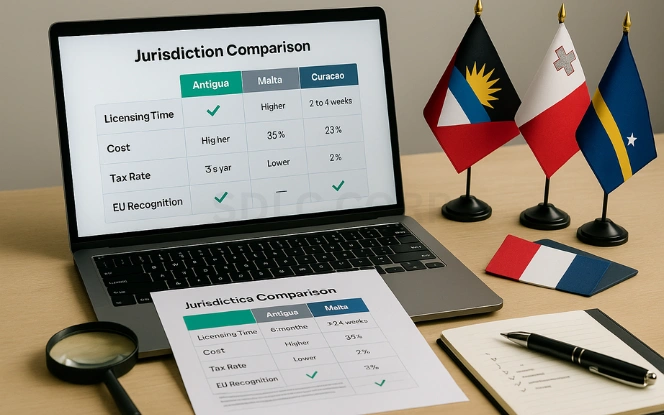
Antigua and Barbuda stand out in several ways when compared with other regulatory jurisdictions:
- Balanced Regulation: Encourages innovation while maintaining safeguards.
- Cost Efficiency: Lower setup and operational costs compared to EU jurisdictions.
- Historical Authority: Decades of regulatory experience offer a sense of stability and reliability.
This combination makes Antigua a practical and trustworthy option for businesses aiming for rapid global expansion.
Who Should Apply?
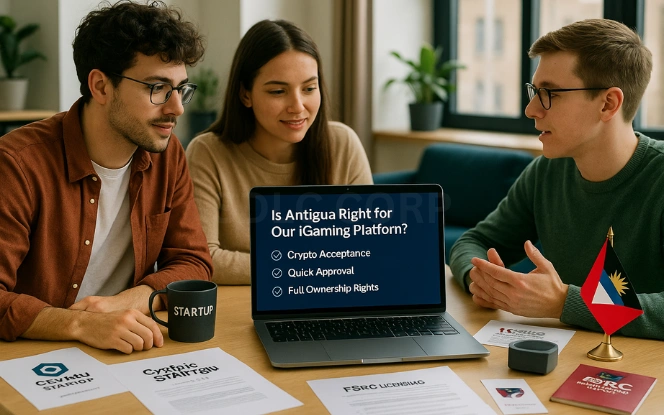
An Antigua license is ideal for:
- New operators entering the iGaming space
- Existing companies looking to expand internationally
- Crypto-focused or hybrid gambling platforms
- Sportsbooks needing an Interactive Wagering License Antigua
- Casinos seeking an efficient Interactive Gaming license route
Potential Challenges to Consider
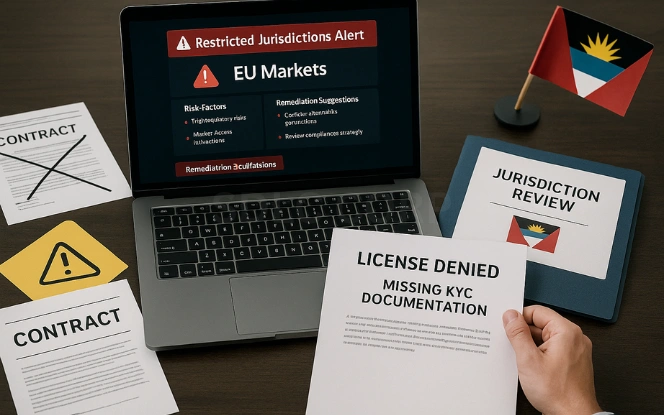
While Antigua offers several benefits, there are a few challenges to be aware of:
- Market Restrictions: Some countries may not accept offshore licenses.
- Perceived Risk: Certain financial institutions may require extra documentation.
- Strict Due Diligence: Incomplete or inaccurate documents can delay approvals.
Working with professionals experienced in FSRC compliance can help address these concerns.
Concerned about risks? Read our post on The Role of Licensing Bodies in the Online Gambling Industry.
Conclusion
The Antigua and Barbuda gaming license remains a powerful option for iGaming operators worldwide. With its established regulatory body, clear Antigua and Barbuda gaming license requirements, and strict adherence to AML KYC protocols, it offers a balanced approach to compliance and innovation.
Understanding the difference between Interactive Gaming vs Interactive Wagering license Antigua is vital to align with your business goals. While the cost of the Antigua and Barbuda iGaming license reflects its premium nature, the value it brings in global recognition, tax incentives, and credibility is substantial.
To start your licensing journey or receive expert support contact us today for tailored guidance and documentation assistance.
FAQs
What Is the Difference Between the Interactive Gaming and Interactive Wagering Licenses?
The Interactive Gaming License is for online casino-style games such as poker, blackjack, and roulette, while the Interactive Wagering License covers sports betting activities, including live and fixed-odds wagering.
How Long Does It Take to Get an Antigua and Barbuda Gaming License?
The licensing process typically takes 8–12 weeks, depending on how quickly and accurately all documents are submitted and approved. Delays can occur if background checks or compliance reviews require further clarification.
Is an Antigua Gaming License Accepted in European Markets?
While the Antigua license is globally recognized, not all European countries allow offshore-licensed operators. It’s important to review local laws or pursue additional licensing if you plan to target the EU market.
Can a Foreign Entity Own 100% of an iGaming Company in Antigua?
Yes, Antigua and Barbuda allows 100% foreign ownership of licensed iGaming companies, making it an attractive option for international entrepreneurs and startups.
Are There Any Mandatory Physical Office Requirements in Antigua?
While not always mandatory, having a local representative or service provider in Antigua is recommended to maintain compliance and facilitate communication with the FSRC.

